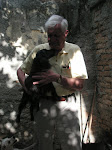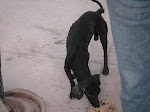Waste Not, Want Not
Both Cuba and the US have laws preventing the use of drugs beyond their expiration dates. While some suspect the biggest reason behind these laws is to insure the profits of the drug companies, these laws are studiously respected, and thus we can all rest assured the medicines we receive are fresh. Expiration dates are common for many medical supplies also like latex gloves, injection syringes, sutures and staples, and bandages--even gauze pads. Vets as well as medical doctors respect the expiration dates, so animals as well as humans need not fear drugs which have lost their efficacy.
Here in the US, older drugs are segregated, and, if the nurse in charge is extremely careful, drugs within a couple of weeks of their expiration dates can be returned for credit to the drug manufacturer. More often than not, this tight time frame for returning expired meds is missed, and they end up being destroyed. US vets are as religious as medical doctors in following the law.
In Cuba, however, things are different. While medical doctors and hospitals use fresh drugs only, vets who treat dogs and cats there have to make do with whatever they can find to treat household pets. The state owns the farm animals and the vets apply their best practice and fresh drugs on them. But household pets are of no interest to the state, and it is difficult to find fresh drugs in the doses that apply to smaller animals.
Many Cuba vets work with donated outdated drugs given to them by hospitals. Jose, our vet friend who works in Old Havana (see Making Ends Meet in this blog for June 11) has a box of old injectable drugs given to him by a hospital. He has become an expert in how long past the expiration date various kinds of medicines are still effective. He has found some anesthetic drugs work several years after expiration. He also has found some drugs can be substituted for others and work almost as well. In Cuba--with veterinary medicines--necessity is the mother of invention.
Is it a bad thing these drugs are used after expiry? Well, I'm not so sure. How many dogs and cats have survived surgeries, infections, and other threats due to the good offices of Cuba's fine, hard pressed veterinarians? A huge number, I believe.
Here at The Aniplant Project, we have been collecting drugs too old for return from several vets. With a little trouble these can be inventoried, packed, and shipped to Cuba. If Nora Garcia, the President of Aniplant, can't use them, she can trade them to the may vets she knows for their help in her weekly spay-neuter clinics
If you have a vet, ask him if he has outdated meds and supplies. Tell him we can use them to help Cuban dogs and cats. Good vets care about animals everywhere, and many vets are happy to donate when asked. Another source of these medicines are drugs left over after a pet dies. People often give them back to their vets. Regardless, call me if you get any such meds or supplies (941-928-8343 anytime). I'll take them off your hands, and you can become a participant in helping lots of needy animals really close to us--just across the Florida Straits/
Les Inglis
Friday, November 12, 2010
Subscribe to:
Post Comments (Atom)






























































































No comments:
Post a Comment